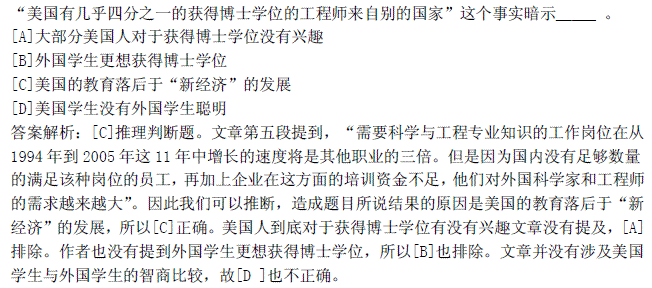a U. S. employer’s sponsorship.
financial capital to create ten jobs.
a job in an American company.
the help of an immigration lawyer.
第1题:
假设有如下的记录类型: Type Student number As String name AS String age As Integer End Type 则正确引用该记录类型变量的代码是______。
A.Student. name="" s. name="张红"
B.Dim s As Student s. Dame="张红"
C.Dim s As Type Student s. name="张红"
D.Dim s As Type s. name="张红"
第2题:
查询选修课程在5门以上(含5门)的学生的学号、姓名和平均成绩,并按平均成绩降序排序,正确的命令是( )。
A.SELECT S.学号,姓名,平均成绩FROM student s,score sc WHERE S.学号=sc.学号 GROUP BY s.学号HAVING COUNT(*)>=5 ORDER BY平均成绩DESC
B.SELECT s.学号,姓名,AVG(成绩)FROM student s,score sc WHERE s.学号=SC.学号AND COUNT(*)>=5 GRoUP BY学号0RDER BY 3 DESC
C.SELECT S.学号,姓名,AVG(成绩)平均成绩FROM student s,score sc WHERE s.学号=SC.学号AND COUNT(*)>=5 GROUP BY s.学号ORDER BY平均成绩DESC
D.SELECT s.学号,姓名,AVG(成绩)平均成绩FROM student s,score sc WHERE s.学号=sc.学号 GROUP BY s.学号HAVING COUNT(*)>=5 0RDER BY 3 DESC
第3题:
The increase in international business and in foreign investment has created a need for executives with knowledge of foreign languages and skills in cross-cultural communication. Americans, however, have not been well trained in either area and, consequently, have not enjoyed the same level of success in negotiation in an international arena as have their foreign counterparts.
Negotiating is the process of communicating back and forth for the purpose of reaching an agreement. It involves persuasion and compromise, but in order to participate in either one, the negotiators must understand the ways in which people are persuaded and how compromise is reached within the culture of the negotiation.
In many international business negotiations abroad, Americans are perceived as wealthy and impersonal. It often appears to the foreign negotiator that the American represents a large multi-million-dollar corporation that can afford to pay the price without bargaining further. The American negotiator's role becomes that of an impersonal supplier of information and cash.
In studies of American negotiators abroad, several traits have been identified that may serve to confirm this stereotypical perception, while undermining the negotiator's position. Two traits in particular that cause cross-cultural misunderst anding are directness and impatience on the part of the American negotiator. Furthermore, American negotiators often insist on realizing short-term goals. Foreign negotiators, on the other hand, may value the relationship established between negotiators and may be willing to invest time in it for long-term benefits. In order to solidify the relationship, they may opt for indirect interactions without regard for the time involved in getting to know the other negotiator.
Clearly, perceptions and differences in values affect the outcomes of negotiations and the success of negotiators. For Americans to play a more effective role in international business negotiations, they must put forth more effort to improve cross-cultural understanding.
(1) What kind of manager is needed in present international business and foreign investment?
A、The man who represents a large multi-million-dollar corporation.
B、The man with knowledge of foreign languages and skills in cross-cultural communication.
C、The man who is wealthy and impersonal.
D、The man who can negotiate with his foreign counterparts.
(2) According to the passage, international business negotiation involves.
A、short-term goals
B、long-term benefits
C、information and cash
D、persuasion and compromise
(3) In the foreign negotiators’eyes their American counterparts are.
A、impersonal suppliers of information and cash
B、skillful in negotiation
C、good at establishing relationship between negotiators
D、indirect and impatient
(4) Which of the following is NOT mentioned in the passage?
A、Foreign negotiators are willing to invest time in relationship between negotiators.
B、American negotiator's directness and impatience cause cross-cultural misunderstanding.
C、Americans has played a more effective role in international business negotiations.
D、Foreign negotiators think that American can afford to pay the price without bargaining
(5) What is the topic of this passage?
A、The differences between American negotiators and foreign negotiators
B、Negotiation skills
C、International business and cross-cultural communication
D、Cross-cultural understanding
第4题:
第5题:
第6题:
In the U. S., at Christmas, schoolchildren have ______ for holiday.
A. a month
B. a week
C. two weeks
D. three weeks
第7题:
The fact that "almost one-fourth of engineers in America who earned Ph.D. s are foreign born" implies that( )
[A] the majority of American people are not interested in getting Ph.D.
[B]foreign students are more eager to get Ph. D.
[C] the American education has lagged behind in the New Economy
[D]American students are not as clever as foreign students

第8题:
The writer mentioned the case of the United States to justify the policy of _______ .
A providing financial support overseas
B preventing foreign capital's control
C building industrial infrastructure
D accepting foreign investment
第9题:
第10题: